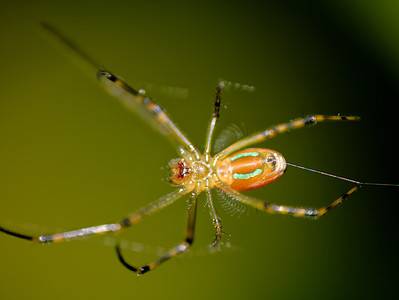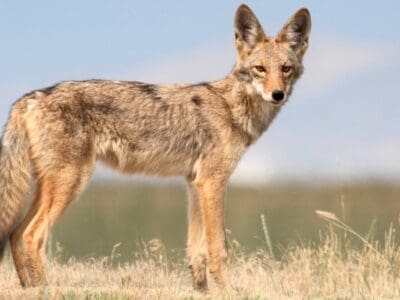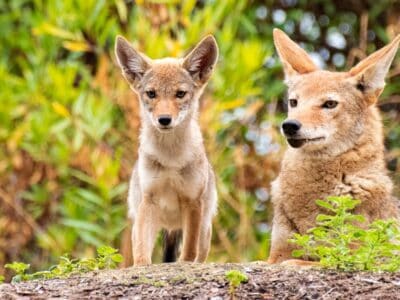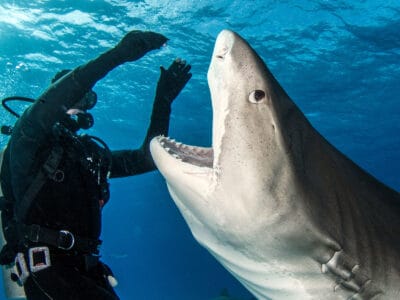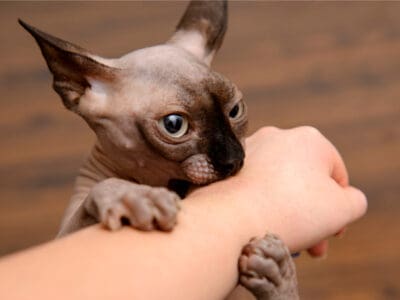Dalmador
Canis lupus
Dalmador breeding skyrocketed after the 16 release of the live-action 101 Dalmatians movie.
Advertisement
Dalmador Facts
Dalmador Physical Characteristics
Dalmador as a Pet:
- General Health
- Energy Level
- Shedability
- Trainability
- Intelligence
- Tendency to Chew
- Size
- Family and kid friendliness
- Yappiness / Barking
- Moderate
- Separation Anxiety
- High
- Preferred Temperature
- Average climate
- Exercise Needs
- Moderate
- Friendly With Other Dogs
- Moderate
- Pure bred cost to own
- $1,000
- Dog group
- Working
- Male weight
- 54-80 lbs
- Female weight
- 48-74 lbs
This post may contain affiliate links to our partners like Chewy, Amazon, and others. Purchasing through these helps us further the A-Z Animals mission to educate about the world's species.
View all of the Dalmador images!
Dalmadors are loyal dogs that are excited to explore the world. Take your dalmador on plenty of walks; it needs the exercise, and it will love to see what’s outside your front door.
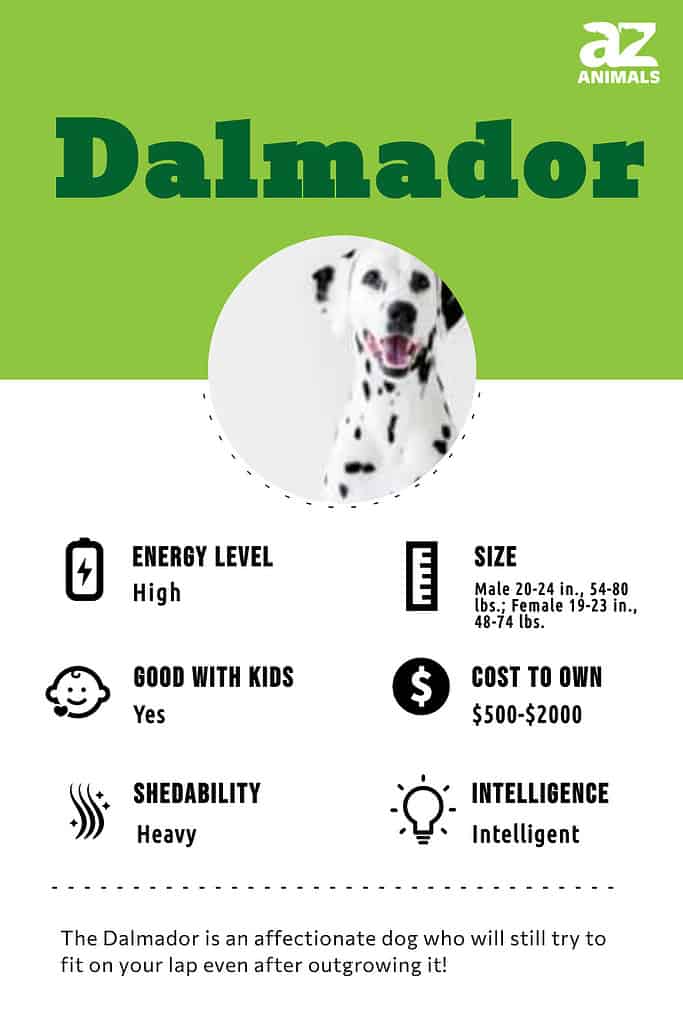
When you combine the spots of a a Dalmatian with the friendly temperament of a Labrador retriever, you get the charming working dog known as the Dalmador. These pups are affectionate and attentive towards their owners, but they’re also alert and capable of guarding, herding, and generally helping out as only a dog can. Dalmador owners love knowing that their best friend is always looking out for them.
See all of our expert product reviews.
Concerning the Dalmador ancestry, Dalmations got their name from a coastal area in Austria called Dalmatia. Descended from pointers, Dalmatians served as coach dogs in 19th century Europe. Coach dogs moved alongside horse-drawn carriages occupied by members of British noble families. Today, the stereotype is that of a Dalmation riding on a firetruck.
As to the other parent of this hybrid breed, Labrador retrievers were bred from Canadian fishing dogs found in the Labrador Territory of Newfoundland. They were also known as St. John’s Water Dogs, after St. John’s, the capital of Newfoundland. Originally, their job was to help pull in the fishing nets, so they are great swimmers. In modern times, they have become a hunting dog as well as America’s favorite pet dog.
3 Pros and Cons of Ownership
| Pros | Cons |
| Unique patterns: Dalmadors all have different coats with variations on the classic dalmatian pattern. Expect to see spots peeking out from brown, tan, black, and chocolate coats of fur. | Separation anxiety: They are very attached to their owners and don’t do well when left alone. From barking to destructive behaviors, you’ll have a better time if you simply don’t leave your dog alone in the house without someone to watch them. |
| Intelligent personality: They are smart and alert dogs that constantly watch their environment. These dogs are easy to train and are great for assigning tasks. | Extra shedding: Dalmatians and labs are both heavy shedders, and the hybrid dalmador is no exception. Shedding will increase twice a year when the seasons change. |
| Active lifestyle: They are high-energy dogs that love to run and play. If you own a large property or have an active lifestyle, these dogs will get along well with you. | Guarding instinct: They are very protective of their families. Although this can be a positive trait, it makes inviting new people over to your house difficult. |
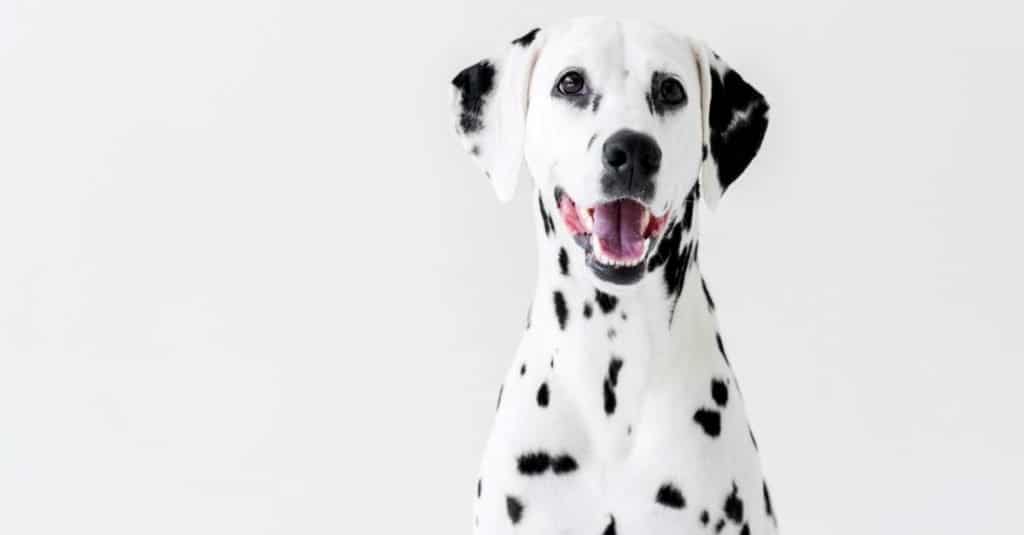
Dalmadors are high-energy dogs that are smart and alert.
Size and Weight
Dalmadors are medium-large dogs with lean builds and beautiful coats of chocolate, tan, black, brown, and white fur decorated with a random pattern of spots. The average dog stands between 19 and 24 inches tall. Their weights range between 58 and 80 pounds and can vary greatly based on the genetic traits that were passed down to each individual dog. Females are almost always smaller than males of the same litter.
| Height (Male): | 20 to 24 inches |
| Height (Female): | 19 to 23 inches |
| Weight (Male): | 54 to 80 pounds |
| Weight (Female): | 48-74 pounds |
Common Health Issues
Dalmadors are prone to many of the same health issues that plague purebred dalmatians. Among the problems to look out for are joint dysplasia, kidney stones, deafness, and more serious genetic problems like autoimmune thyroiditis. These dogs in particular suffer from the impacts of bad breeding. Make sure to take your puppy to the vet for a checkup immediately after you adopt it. The things your vet will check for include:
- Joint dysplasia
- Patellar luxation
- Kidney stones
- Autoimmune thyroiditis
- Deafness
Temperament
Dalmadors are bright, attentive, alert, and energetic. These dogs have very work-focused personalities, which means that they are happiest when they have something to do. Whether it’s running around the backyard or guarding the living room, your dog will pride itself on doing its assigned task exceptionally well.
Health and Entertainment for your Dalmador
See all of our expert product reviews.
The other side of a dalmador’s personality comes out when these dogs don’t get enough exercise. Expect destructive behaviors like chewing, barking, and generally not listening, especially if the walks have been skipped for several days in a row. However, once you get the exercise levels back up, your pet should turn into a perfect angel.
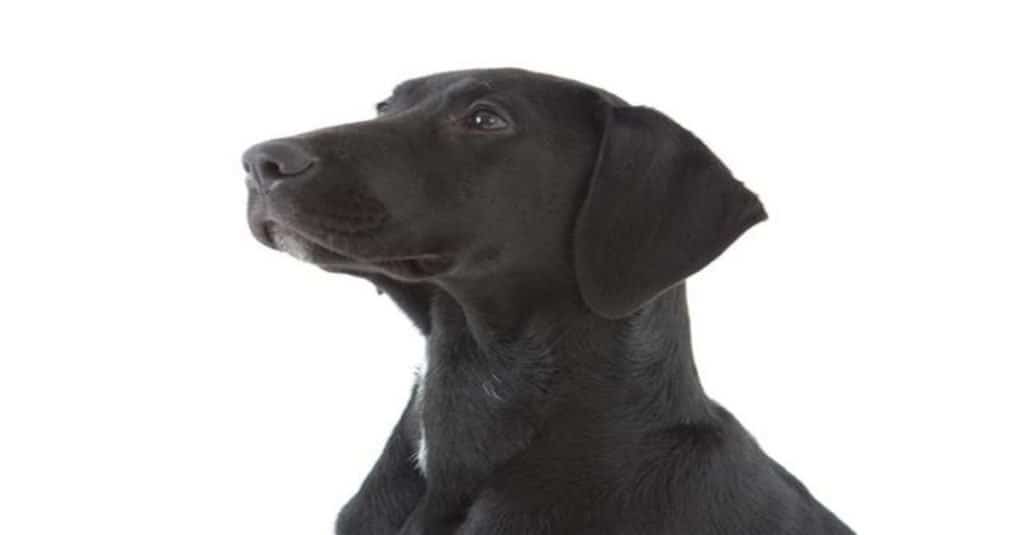
Dalmadors constantly watch their environment. These dogs are easy to train and are great for assigning to tasks.
©iStock.com/smrm1977
Care
Dalmadors need a lot of exercise to be happy. These dogs aren’t a good choice for apartment living; instead, make sure they have plenty of land to run around on.
Best Dog Food
These are medium dogs that don’t have nearly as high caloric needs as many owners think. Reducing your dog’s portions can be a good way to decrease its energy levels, especially if it is engaging in destructive behaviors. Remember to feed high-quality kibble that focuses on protein and healthy fats. Take the Dalmador’s unique health concerns into account when choosing appropriate food. Talk to your vet about preventing joint, kidney, and autoimmune problems, and treating them if they arise.
At A-Z Animals, we believe the best dog food for Dalmadors is Eukanuba Adult Dry Dog Food Chicken – Large Breed Senior.
Although it states it’s for senior dogs, it has an excellent nutritional profile for addressing Dalmador’s health needs, especially their risk for joint dysplasia and patellar luxation. This formula contains 50% extra glucosamine, plus chondroitin sulfate from animal protein for maximum joint support. Pus, antioxidants enhance overall health and wellbeing.
Try out Eukanuba Large Breed Senior Dog Food, available on Chewy and Amazon.
- Chicken recipe for dogs 7+ years old
- Promotes healthy immune system and healthy teeth and gums
- DHA and antioxidants for brain health
- 50% more glucosamine for healthy bones and joints
Grooming
Dalmadors shed quite a bit and should be brushed frequently to keep their coats in good condition. Plan to groom your dog at least three times a week with a firm-bristled brush. You should also inspect your dog’s ears regularly and trim its nails on a semi-monthly basis.
Training
Dalmadors are alert working dogs that respond incredibly well to basic commands. After you build a connection with your puppy, try introducing it to more complicated activities like chasing lures or running courses. Stick to short training sessions to maintain your dog’s attention and refresh important concepts on a regular basis.
Exercise
Dalmadors are incredibly active dogs that need a high amount of exercise. Expect to take your pet on two walks every day. Your dog should also have access to a yard to run around in, and you may want to keep its attention with various training activities. Try to wear your dog out to panting at least once a day; the light amount of exhaustion will help prevent destructive behaviors like chewing or barking.
Puppies
Dalmador puppies are playful, energetic, and eager to explore the world. These pups are intelligent and need guidance, especially if they’re descended from a smart breed like the chocolate lab. Spend plenty of time training yours to help it accomplish its fullest potential.
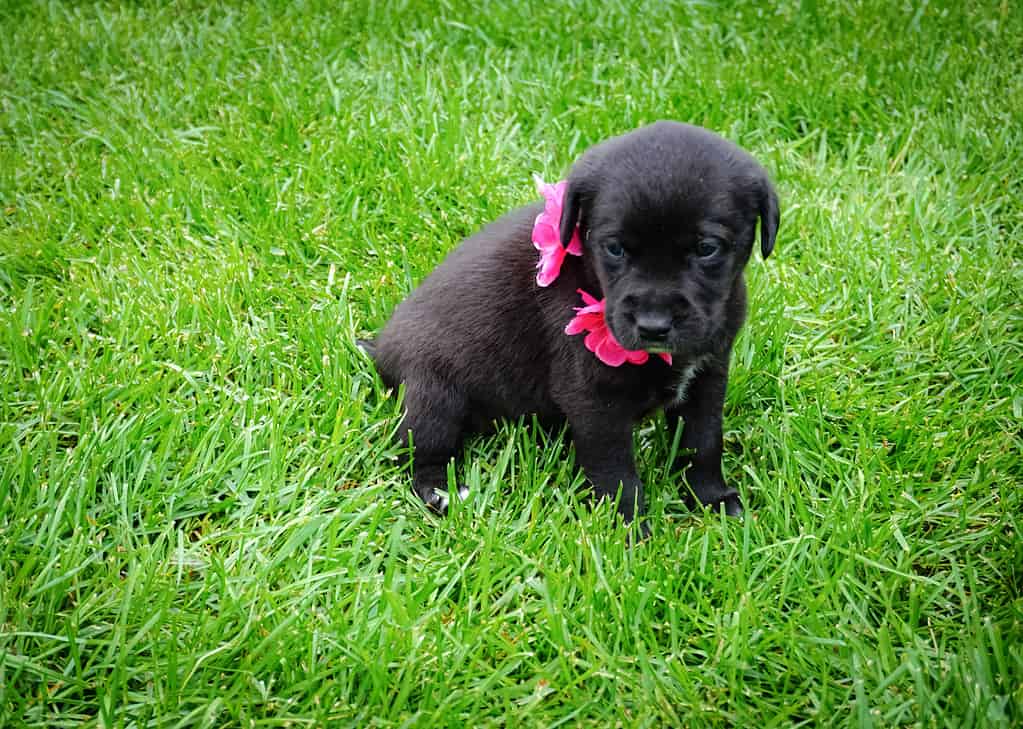
Dalmador coats have variations of the classic Dalmatian pattern with spots peeking out from brown, tan, black, and chocolate coats of fur.
©iStock.com/Denise LeMoine
Children
Dalmadors are alert and active dogs that are good choice for working lifestyles, but they don’t make good family pets. These pups are far too introverted and dependent on their owners to properly socialize, especially at family gatherings. If you have a dalmador, don’t leave them alone with unsupervised children who won’t respect their boundaries.
Similar Dogs
Few dogs quite match the dalmador’s appearance and personality. Some of the best replacement options include the purebred dalmation, the labrador retriever, and the designer dalmadoodle.
- Dalmatian: Purebred dalmatians may be hard to find, but they’re well worth the effort. These dogs are exceptionally loyal.
- Dalmadoodle: Another dalmatian hybrid, the dalmadoodle is an active, loyal dog that’s great for working positions and high-energy lifestyles.
- Labrador Retriever: The balanced but loving personality of the Labrador retriever is popular for a reason. Your lab will treat you with love and kindness, even if it likes to eat a little more than they should.
Popular Names
Good dalmador names are simple, fun, and in some way relevant to your dog’s unique color pattern. Popular names for dalmadors include:
- Sparky
- Siren
- Buster
- Brownie
- Shadow
- Lucky
- Julie
- Jerry
- Dusty
- Dolly
Dalmador FAQs (Frequently Asked Questions)
What is a dalmador?
A dalmador is a hybrid between a dalmatian and a labrador retriever. Dalmadors are sharp, athletic dogs that have brown, black, or white coats with a random amount of dalmatian-style spots. Because different breeders use different genetic parents, the appearance of a dalmador can actually vary quite a bit in terms of size and coat pattern.
How much do dalmadors cost to own?
The price of a purebred dalmador puppy is usually between $500 and $1,000. Low-quality breeders like to produce mass amounts of dalmadors with little concern for genetic traits, so you will certainly receive a better pet if you are willing to pay a higher price. Be careful adopting a dalmador from the shelter or for too low of a price.
Are dalmadors good with kids?
Dalmadors are alert and attentive dogs, but they seldom like to give out affection to anyone other than their owners. Because of this, these dogs are a bad choice for families with children or who cannot maintain an active lifestyle. If you let your dalmador hang out with kids, make sure that the situation is supervised, and put your dog away if he starts to get tired.
How long do dalmadors live?
Most dalmadors live to be between ten and thirteen years old. Your dalmador will live longer if you feed them a healthy diet with plenty of protein and take them out for exercise on a regular basis. Remember, if the food costs less, it might not be nearly as good for your dog.
How big do dalmadors get?
Most dalmadors weigh somewhere between 45 and 80 pounds. These size of your dalmador will depend on a combination of nutrition and genetics. Luckily, most breeders are willing to provide information about the parent dogs, especially when you first bring your puppy home.
Are dalmadors hypoallergenic?
Unfortunately, dalmadors are not hypoallergenic dogs. In fact, these pups shed profusely and require persistent brushing to keep fur levels under control.
Thank you for reading! Have some feedback for us? Contact the AZ Animals editorial team.
Sources
- simplyfordogs.com / Published March 19, 2021
- wagwalking.com / Published March 19, 2021
- petguide.com / Published March 19, 2021
- thelaboradorsite.com / Published March 19, 2021
- doggiedesigner.com / Published March 19, 2021












